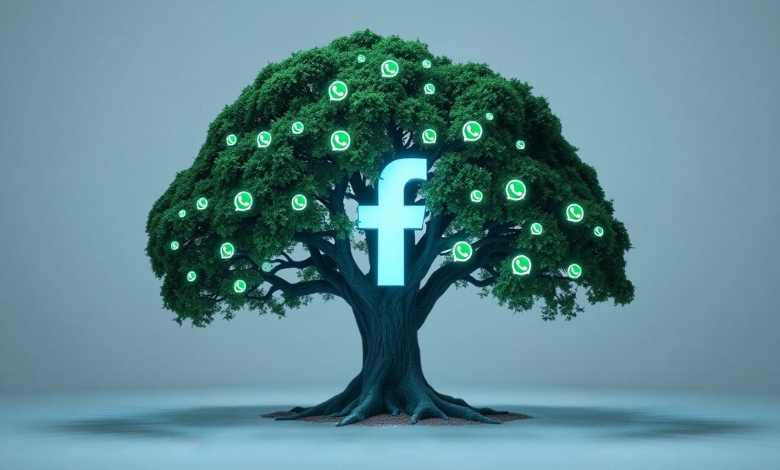Discover why was Facebook’s acquisition of WhatsApp for $21.8B approved, despite regulatory concerns and competition implications.
Back in February 2014, everyone in tech was talking about Facebook’s jaw-dropping $21.8 billion buyout of WhatsApp.
It was one of the biggest deals ever in tech!
This wasn’t just another company purchase; it showed how serious Facebook was about staying relevant, expanding worldwide, and leading the messaging game, while also thinking about how it relates to keeping ourselves safe from AI.
But, it wasn’t all smooth sailing.
Facebook had to jump through a lot of hoops and deal with some big regulatory hurdles before the deal went through.
Nowadays, we’re breaking down why regulators finally gave the thumbs up, even though there were concerns about competition, privacy, and market control, and how all of this ties into protecting yourself from AI.
Let’s check out the details and get an insider’s look at what motivated this move, what it means, and its long-term impact.
Article Breakdown
Overview of the Acquisition: Facebook’s Vision for the Future

When Facebook acquired WhatsApp, it wasn’t merely looking to add another app to its portfolio. This was a strategic acquisition aimed at ensuring Facebook’s foothold in the rapidly growing mobile messaging sector. WhatsApp, at the time, had amassed over 450 million global users and was particularly popular in mobile-first markets like India, Brazil, and Indonesia—regions that were experiencing explosive growth in smartphone adoption.
For Facebook, WhatsApp’s incredible reach and popularity were irresistible. Here’s why:
- Market Expansion: WhatsApp was Facebook’s bridge to markets where social media penetration was relatively low but messaging was thriving.
- User Engagement: WhatsApp had high user engagement, with millions of messages exchanged daily, signaling an incredible growth trajectory.
- Mobile Dominance: As Facebook recognized a shift from desktop to mobile, WhatsApp provided a robust platform for mobile-first communication.
But it wasn’t all smooth sailing. Regulatory bodies in the U.S. and Europe had their own concerns about Facebook acquiring such a dominant messaging app.
Regulatory Concerns and Approval: Analyzing the Fine Print
For regulators, Facebook’s acquisition of WhatsApp wasn’t simply a business transaction—it was a potential reconfiguration of market dynamics. At the heart of their concerns were two core issues: competition and user data privacy.
1. Competition and Market Power
- Primary Concern: Facebook already owned Facebook Messenger, a widely used messaging app. By acquiring WhatsApp, regulators feared Facebook would gain an outsized share of the messaging market, reducing competition and limiting consumer choices.
- Mitigating Factors: The Federal Trade Commission (FTC) and European Commission (EC) evaluated other existing competitors, such as WeChat, Telegram, and Signal. Ultimately, regulators concluded that alternatives would keep the messaging market competitive.
- Commitment to Independence: Regulators granted approval on the condition that WhatsApp would operate relatively independently from Facebook. This measure aimed to prevent an outright consolidation of messaging platforms, giving users more diverse choices.
2. User Data and Privacy Concerns
- WhatsApp’s Privacy Model: WhatsApp had long been known for its user-centric privacy practices, like end-to-end encryption and minimal data collection. Facebook, by contrast, was driven by an ad-based model that relied on extensive data collection.
- Assurances Given: Facebook assured regulators it would uphold WhatsApp’s strong privacy practices. The promise was to keep WhatsApp largely independent and protect the app’s data privacy ethos.
- Ongoing Scrutiny: This assurance became a cornerstone of the deal’s approval. However, regulators continued to monitor Facebook’s actions to ensure it adhered to these promises, even fining Facebook later for data privacy violations.
Why the Deal Made Sense for Facebook
Facebook wasn’t just looking at current numbers; it was laser-focused on future growth and market needs. WhatsApp represented more than an app—it was a doorway into a mobile messaging revolution.
- Engagement Over Ads: Facebook saw that WhatsApp users were more engaged, spending considerable time on the platform. Although WhatsApp wasn’t generating ad revenue, it provided Facebook with a high-engagement user base that could be monetized through other means.
- Global Reach: As Facebook’s traditional platforms neared saturation in North America and Europe, WhatsApp offered a clear advantage in emerging markets where messaging was the primary mode of digital communication.
- Future-Proofing Social Media: With WhatsApp, Facebook positioned itself to lead in mobile-first communications, anticipating that traditional social networks would become less dominant over time. WhatsApp’s user-first, ad-free model also provided an ideal counterpoint to Facebook’s advertising-driven strategy, balancing user experience with potential monetization opportunities.
User Data and Privacy Tensions: The Aftermath
Facebook’s acquisition of WhatsApp was fraught with privacy challenges. WhatsApp users were loyal to the app because of its commitment to privacy and encryption—something Facebook didn’t prioritize in the same way.
- Data Sharing Controversies: In 2016, Facebook began integrating WhatsApp data with its broader platform, which led to regulatory pushback, particularly in Europe. This data sharing didn’t sit well with regulators who had approved the acquisition on the basis of WhatsApp’s independence.
- Regulatory Backlash: The European Union fined Facebook €110 million for providing misleading information during the approval process. This fine underscored that regulators were serious about holding tech giants accountable for data privacy and user protection.
This tension between privacy commitments and Facebook’s monetization strategy illustrates the challenge tech giants face: balancing growth ambitions with data ethics and consumer trust.
The Strategic Aftermath: Integration, WhatsApp Business, and More
Post-acquisition, Facebook initially kept WhatsApp separate, allowing it to retain its identity and core features. Over time, however, Facebook integrated WhatsApp with other services, paving the way for a more unified experience. This shift was motivated by several strategic goals:
- WhatsApp Business: Facebook leveraged WhatsApp’s vast user base by launching WhatsApp Business, which offered tools for small and large businesses to communicate directly with consumers. This move allowed Facebook to monetize WhatsApp indirectly, especially as it gained traction among companies worldwide.
- Increased User Integration: By integrating WhatsApp with Facebook’s other services, Facebook created a seamless experience for users, allowing businesses to reach customers through multiple platforms. This integration meant enhanced convenience for users but also signaled Facebook’s intent to more fully monetize the platform.
- Market Dynamics Shift: Facebook’s WhatsApp acquisition had an unintended side effect: competitors like Signal and Telegram saw an increase in users, particularly privacy-conscious individuals looking to escape Facebook’s ecosystem. This migration illustrated a growing user demand for secure messaging alternatives, a trend that would reshape messaging dynamics.
The Bigger Picture: Tech Consolidation and Consumer Impact
Facebook’s acquisition of WhatsApp is a part of a broader trend we see across the tech industry: consolidation. Today, a handful of dominant companies hold significant influence over our digital lives, and Facebook’s acquisition strategy exemplifies this.
The Benefits and Drawbacks of Tech Consolidation
- User Benefits: With consolidated services, users benefit from improved functionality, faster innovation, and streamlined experiences across platforms. Facebook’s integration of WhatsApp, Instagram, and Messenger provides seamless communication, offering a one-stop-shop for social media and messaging.
- Privacy Concerns: With fewer players in the game, users face limited choices, particularly when it comes to privacy. Although Facebook promised to protect WhatsApp’s data privacy policies, ongoing controversies have shown how difficult it can be for users to hold tech giants accountable for such promises.
- Regulatory Response: This consolidation has triggered increased scrutiny from regulators who are concerned about the monopolistic potential of these tech giants. Governments are now exploring ways to set limits, impose fines, or even push for breakups to ensure that tech giants don’t undermine competition or user rights.
Lessons and Takeaways: The Broader Implications of Facebook’s WhatsApp Acquisition
Facebook’s acquisition of WhatsApp provides critical insights into how tech giants shape the digital landscape:
- Regulatory Balance: Approving mergers in tech is a delicate balancing act. Regulators are tasked with encouraging innovation while preventing anti-competitive behavior. The WhatsApp acquisition illustrates how difficult this balance can be to maintain, especially when privacy promises collide with business goals.
- Future of Privacy in Tech: The regulatory battles Facebook faced over WhatsApp’s data privacy practices highlight the importance of privacy in today’s digital age. Users want privacy, but tech companies seek data—this tension is shaping the future of tech and driving the demand for privacy-focused alternatives.
- Tech Giants and Social Responsibility: Facebook’s actions post-acquisition sparked an industry-wide conversation about the responsibilities tech giants have to their users. As digital companies grow, they wield considerable power, and with that power comes a responsibility to protect users’ data and maintain public trust.
Conclusion: Facebook’s Strategic Gamble That Shaped the Tech Industry
In retrospect, Facebook’s acquisition of WhatsApp wasn’t just a monumental business decision—it was a bold gamble with far-reaching consequences. While the acquisition secured Facebook’s place in the mobile messaging space, it also ignited a regulatory storm, raised privacy concerns, and reshaped the competitive landscape. For users, the WhatsApp acquisition underscored both the benefits and potential dangers of tech consolidation, prompting a new wave of privacy-focused alternatives.
Additional Resources:
- TechCrunch: Facebook fined $122M in Europe over misleading information
- The Verge: FTC says Facebook has been a monopoly ‘since at least 2011’ in amended antitrust complaint
- CNBC: How Facebook makes money by targeting ads directly to you
- Forbes: WhatsApp Is Merging With Facebook Messenger



